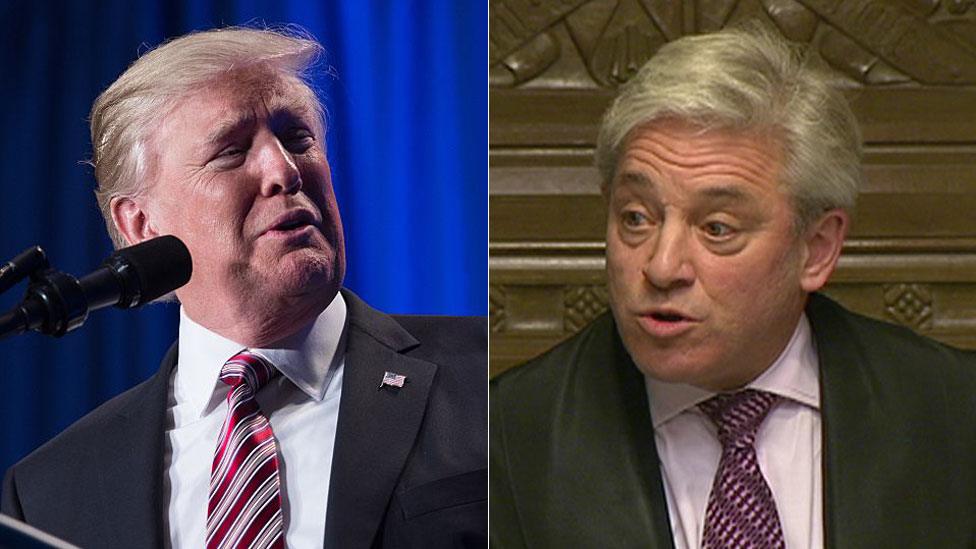Week ahead
- Published
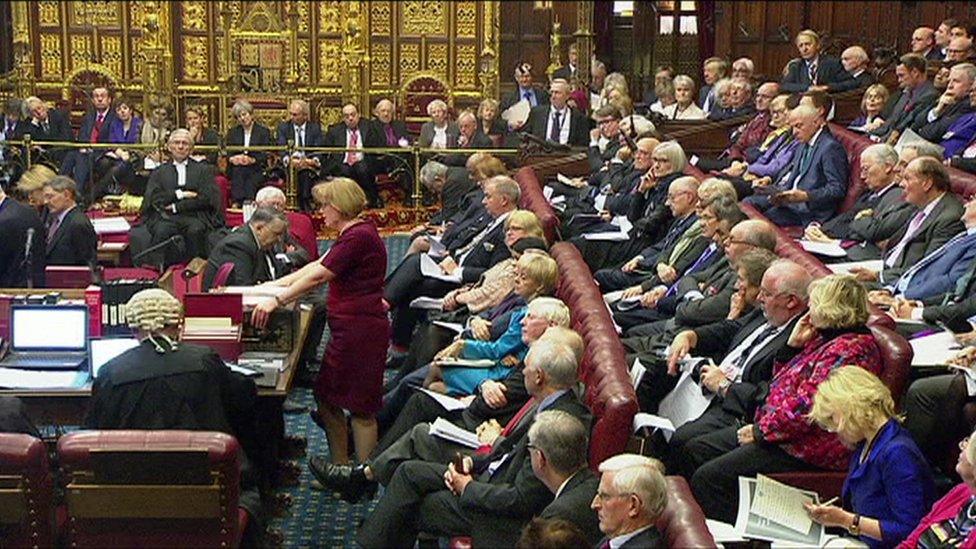
After last week's marathon (drone-athon?) in the Lords, peers will next week get on to the really crucial section of the debate on the Brexit Bill, aka the European Union (Notification of Withdrawal) Bill.
Two days of committee stage debate are scheduled, with more opportunities to press amendments at the ensuing report stage. And there are plenty of amendments down. The question is whether any of them will attract a critical mass of peers, capable of voting through an amendment.
I expect quite a lot of merging of the existing amendments so that they're reconfigured to maximise the coalitions that can be assembled behind them.
There seems to be some head of steam behind three broad causes: the "meaningful vote" by Parliament already promised by the government - where a lot of peers seem to want that assurance from the Brexit Minister David Jones to be written into the bill; the status of EU nationals resident in Britain, where the key player may well be the Crossbench peer and ex-mandarin Bob Kerslake and where a Tory peer, Lord Bowness, has signed up to a Labour amendment; and, perhaps, the Single Market, where there is some pressure to write in a requirement to maintain UK membership in some way.
There are also amendments down about UK membership of organisations like EURATOM, the atomic energy body, and on issues like the border with Ireland, where the former Northern Ireland secretary Peter Hain is active.
To get passed, any amendment requires a cross-party coalition embracing Labour, Lib Dems, Tory rebels and crossbenchers, and not all of these causes will attract such an alliance.
Watch out for ministerial assurances to meet particular concerns and defuse possible uprisings. But if any amendment is passed, the next key question is the size of the majority; because once amended, the bill would have to go back to the Commons, so that MPs could accept, or more likely reject, the changes.
Peers are more likely to keep pressing an issue if they have passed an amendment with a thumping majority, and more likely to back down if it only squeaked through - so a substantial majority would suggest a couple of rounds of the bill ping-ponging between Lords and Commons and put more pressure on the government to offer some concession, maybe even a compromise amendment of their own, at report stage, next week.
Elsewhere we're mostly back to the pre-Brexit Bill zombie Parliament status, at least until we reach the Budget (sorry, Spring Statement).
The Commons is debating select committee reports, through the arcane mechanism of "Estimates Days" and beavering away on fairly uncontroversial legislation.
If MPs have to react to any Lords amendments to the Brexit Bill, it won't be until after 7 March, when it is due to clear third reading in the Upper House. Till then, the big Commons events will be ministerial statements and maybe some question times.
Monday
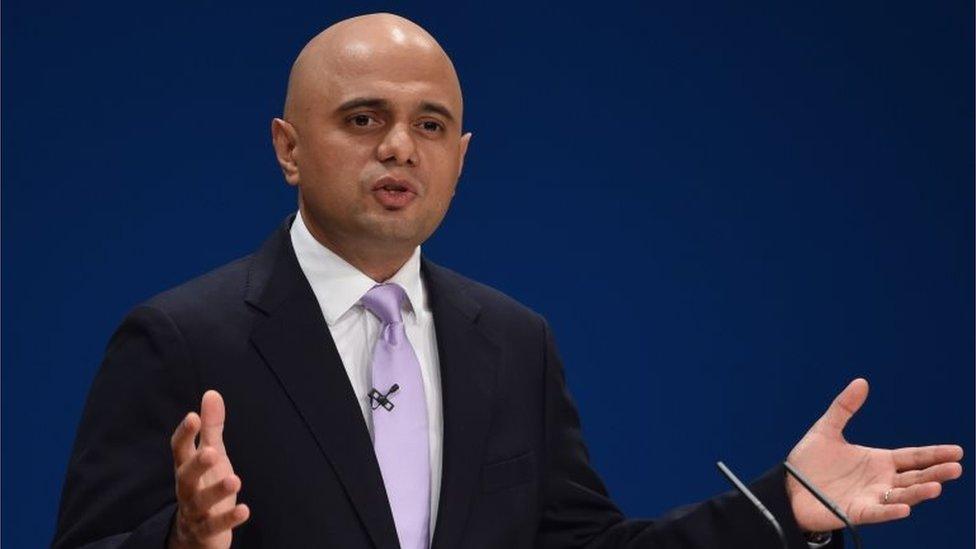
Sajid Javid will be hoping to reassure MPs about business rates reforms
The Commons opens (2.30pm) with immediate drama in the shape of Communities and Local Government Questions, with the beleaguered Secretary of State, Sajid Javid in deep policy mire over his business rate reforms.
Mr Javid is the first member of Theresa May's cabinet to run into serious policy trouble - and having backed Remain in the referendum, when many colleagues believed he really supported Brexit, he's a little short of friends.
His problem over Business Rates is that his department is effectively the agent of the Treasury, so he's caught in cabinet-level infighting. Will Downing Street extend their protection? The body language at this appearance could prove very interesting.
As always, the 3.30pm slot after Monday's question time is the prime moment for any post-weekend urgent questions or ministerial statements - and then the main business of the day is two Estimates Day debates.
The first is on future flood prevention based on the Environment, Food and Rural Affairs Committee report, external on the storms of 2015 - which hit communities across northern parts of the UK. Storm Desmond alone cost the UK more than £5bn. The report warned of more frequent, more intense storms resulting from climate change, and called for the government to publish, by the end of 2017, a 25-year plan for flood risk reduction, against different climate change scenarios.
The second debate is on Health and Social care (which follows on from the PAC hearing below) inspired by a series of committee reports including the Health Committee's report on the "colossal" funding challenge posed by adult social care.
In Westminster Hall (4.30pm) MPs debate E-petition 176138, external on attacks on NHS medical staff. The petition says there are 193 attacks on NHS staff every day in England. It calls for the creation a specific criminal offence - and it has attracted 116,709 signatures.
My committee of the day is the Public Accounts hearing (4 pm) on integrated health and social care. This is an area where the PAC Chair, Meg Hillier, has teamed up with the Health and Local Government committee chairs, Sarah Wollaston and Clive Betts, to push for action to sort out the system.
This session includes evidence from Chris Wormald, the Permanent Secretary at the Department of Health; Simon Stevens of NHS England; Jo Farrar, Director General for Local Government and Public Service at the Department for Communities and Local Government and Sarah Pickup, the DCLG Deputy Chief Executive, Local Government.
In the Lords (2.30pm) questions to ministers include the Iranian-born crossbencher, Baroness Afshar asking about securing the rights of Iranian-born British citizens visiting the US to return to the UK and not to be sent to Iran.
But the main event is the start of committee stage consideration of the European Union (Notification of Withdrawal) Bill (see above) where the debate may well continue late into the night.
Tuesday
In the Commons, MPs open (11.30am) with Treasury questions. The Ten Minute Rule Bill, from Labour MP and former English teacher Nic Dakin would require schools in England to give access to their premises and pupils to representatives from post-16 education institutions, and to and others providing career or training guidance.
Then comes another couple of Estimates Day debates - the first is on the government's productivity plan centring on a report from the then Business Committee, external which noted that UK productivity growth has been stagnant since the financial crisis, and the long-standing gap with international competitors has widened.
That is followed by a debate on a report on Intergenerational Fairness, external, which warns that the millennial generation, born between 1981 and 2000, faces being the first in modern times to be financially worse off than its predecessors.
In Westminster Hall, my eye was caught by the Conservative Nigel Adams' debate (9.30am-11am) on the importance of intellectual property to the British economy - this is an area where the UK government will regain the ability to legislate after Brexit, and it will be increasingly important in the 21st century. Mr Adams, who chairs the All Party Parliamentary Group for Music, is particularly concerned about providing proper protection for musicians - but also about the need to combat the increasing problem on online piracy.
My committee pick is the Transport Committee session (2.20pm) on the cost of car insurance for young people, with witnesses from RAC Foundation, Wheels 2 Work, the British Insurance Brokers' Association and Aviva.
In the Lords (2.30pm) the usual half hour of questions to ministers includes Lord Naseby on the possibility of legislation to regulate drones, particularly to deal with the safety and security risks they pose.
Then peers turn to their second day of report stage debate on the Neighbourhood Planning Bill - watch out for a cross party amendment on the "change of use of drinking establishments" designed to protect local pubs. . The government has already lost one vote on this bill, on regulations around the National Planning Policy Framework.
Wednesday
The Commons begins (11.30am) with Scotland questions, followed at noon by Prime Minister's Questions.
The former Minister for Women and Equalities, Nicky Morgan, will be introducing a Ten Minute Rule Bill, which aims to protect trans people from unintended public disclosure of their former names by the Registrar of Companies.
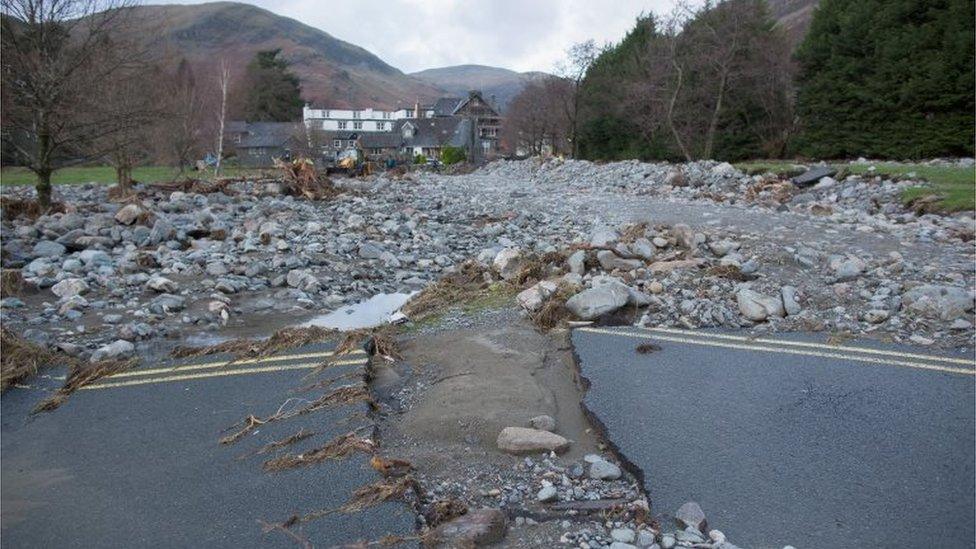
Storm Desmond alone cost the UK more than £5bn
This aims to deal with an unintended consequence of the interaction between the Companies Act 2006 and the Gender Recognition Act 2004 which means that Companies House refuses to withhold from public inspection details about a director's former name even if that would mean that the individual's transition and personal history was therefore disclosed to anyone searching the Register of Directors; so her bill is designed to close the loophole by amending the 2004 Act in a way which would allow Companies House to withhold from public inspection information which could "out" a trans person.
MPs then get their first chance to debate the Bus Services Bill - which aims to increase bus passenger numbers and help cities and regions to use better bus services to boost their economies and to improve journeys for bus users.
The bill started in the Lords where the government suffered a series of defeats as peers, among other things, struck out a clause that would have prevented local authorities in England from forming bus companies, voted to allow all local authorities, not just the new mayoral super-councils, to opt for franchising schemes for buses without permission from the Secretary of State, and to impose low carbon emissions standards on all new buses. Will the government seek to roll back those defeats?
In Westminster Hall, Labour's Luciana Berger (who was briefly shadow minister for mental health) has a debate (11am-11.30am) on rates of suicide and self-harm in prisons in England - she has asked a series of Commons questions on this issues, prompted by what she describes as an "exponential" rise in the number of prison suicides.
She plans to examine factors like a lack of prison officers to monitor inmates who are at risk, a failure to assess prisoners who might be at risk, and problems accessing mental health services.
The Conservative Richard Graham has a debate on Emily's Code and safety on pleasure vessels (4pm-4.30pm) - the code is the result of work by the Gardner family (Clive and Debbie), who lost their daughter, Emily, in a speedboat accident in May 2015. They've been working with the Royal Yacht Association to put together the code to prevent further accidents at sea - it highlights some of the hazards that contributed to her accident.
In his debate on the role of fathers in the family unit (4.30pm-5.30pm) the SNP's Neil Gray plans to highlight the success of the Year of the Dad events in Scotland last year, which aimed to highlight the role of fathers without diminishing the role of mothers. "As a father myself it is an area clearly that I care about," he said.
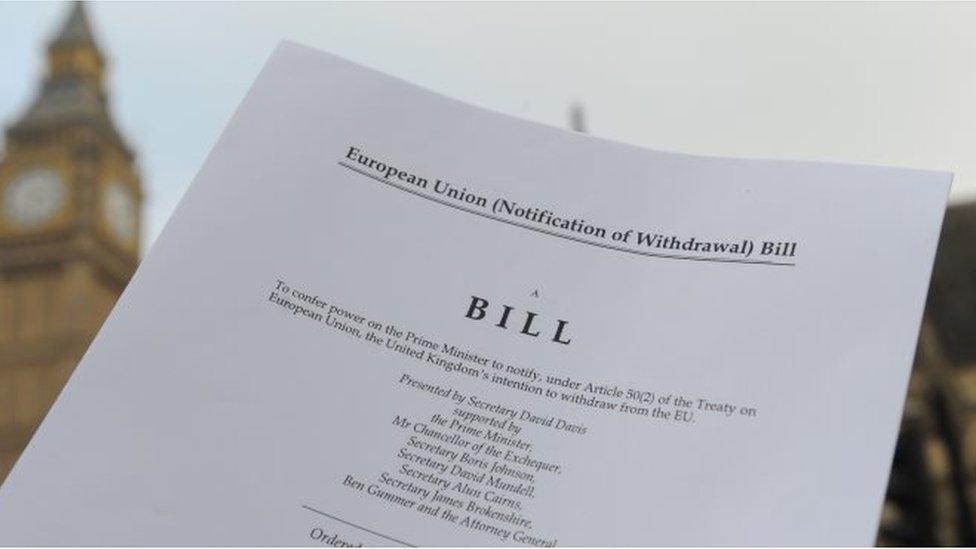
The second day of committee stage on the Brexit bill in the Lords could see a late night sitting...
My committee of the day is the Education Committee hearing (9.30am) with foster care providers and representatives of organisations involved in the care of looked after children. This is the second evidence session of its inquiry into fostering which is focused on how well the system is functioning.
In the Lords (3pm) it's day two of committee consideration of the European Union (Notification of Withdrawal) Bill. There's also a short debate on Ensuring the Clinical Commissioners respect the undertakings made in Our Commitments to you for end of life care: The Government Response to the Review of Choice in End of Life Care, external, led by the Crossbencher Baroness Finlay of Llandaff who is a professor of palliative medicine.
Thursday
The Commons meets (9.30am) for Environment, Food and Rural Affairs questions and then mini-question times for the MPs who speak for the Church Commissioners, the House of Commons Commission, the Public Accounts Commission and the Speaker's Committee on the Electoral Commission.
Then comes the weekly Business Statement from the Leader of the House, David Lidington.
The rest of the day is devoted to backbench debates on Welsh affairs and International Women's Day; both of these are normally given a whole day - the fact that they're crammed into a single afternoon underlines the demand for debating time for subjects chosen by backbench MPs.
In Westminster Hall, there's a debate on the Work and Pensions Committee report on Support for the Bereaved, which found the system for state bereavement support "opaque and outdated" - it said that over the years the benefit has been devalued to the point where it does not cover a simple funeral. It called for the government to negotiate a flat rate simple funeral with the funeral homes which could then be accredited as part of a fair funeral scheme. The government has said that prescribing what a claimant should expect as part of a funeral may not lead to the select committee's desired outcome, and that a "one-size funeral fits all" approach would not be appropriate. Committee Chair Frank Field leads the debate.
Next comes a general debate on UK policy on torture and the treatment of asylum claims.
My committee pick is the Home Affairs hearing (10.30am) on the Scottish dimension on immigration, with the Scottish Government's Minister for International Development and Europe Dr Alasdair Allan.
In the Lords (11am) the main events are debates on two select committee reports - on Building More Homes and on Brexit: the options for trade. And peers will also be asked to approve orders setting up two more super-councils - in Cambridgeshire and Peterborough and Tees Valley Combined Authority.
Neither House sits on Friday.
- Published7 February 2017
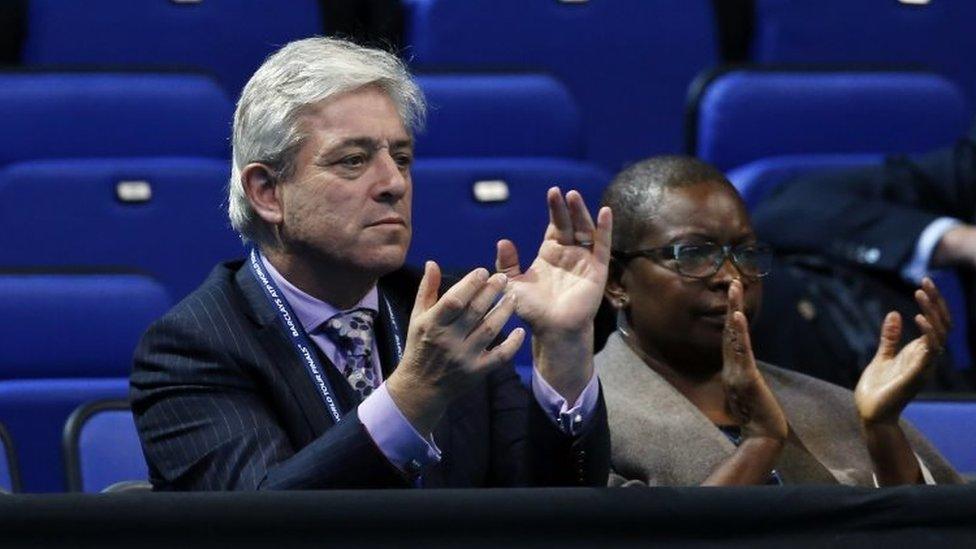
- Published6 February 2017
